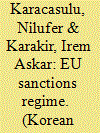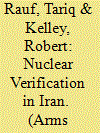|
|
|
Sort Order |
|
|
|
Items / Page
|
|
|
|
|
|
|
| Srl | Item |
| 1 |
ID:
134081


|
|
|
|
|
| Publication |
2014.
|
| Summary/Abstract |
Although there is enormous discussion on normative power Europe, there is relatively less focus on the EU sanctions regime, though sanctions have become a useful foreign policy tool as the EU has applied sanctions within the framework of the Common Foreign and Security Policy. Looking at the literature, Kreutz focused on the EU sanctions regime in the time period of 1981-2004, during which sanctions
were used to accomplish normative goals. Yet, later on Brummer argued that although norms and values still play a role in the EU's sanctions regime, more often they were surpassed by security and economic interests. This article examines the previous work on the EU sanctions regime and tries to comprehend why the use of sanctions has increased over time as well as whether they have been "selectively" used. In addition, the article analyzes whether the normative commitment is crucial in the construction of the EU sanctions regime. The EU sanctions regime toward Iran is analyzed in particular, because as indicated by Santini and Tabrizi, Iran is the first country against which the EU has developed a new strategy out of weapons of mass destruction concerns, starting in 2006. Since 2010, EU foreign ministers have adopted tougher sanctions in an effort to block its controversial nuclear program. Recently, the Iran nuclear deal of November 2013 was interpreted as attributable to sanctions against Iran, in which EU sanctions have constituted a remarkable role, have proven effective.
|
|
|
|
|
|
|
|
|
|
|
|
|
|
|
|
| 2 |
ID:
134083


|
|
|
|
|
| Publication |
2014.
|
| Summary/Abstract |
For nearly a year, negotiations on Iran's nuclear program have been underway between Iran and the EU3+3 (China, France, Germany, Russia, the United Kingdom, and the United States).[1] The two sides in the negotiations, which the European Union has facilitated, are seeking a "mutually-agreed long-term comprehensive solution that would ensure Iran's nuclear programme will be exclusively peaceful."[2]
In November 2013, the sides agreed to an arrangement known as the Joint Plan of Action, under which Iran has taken substantial steps to address proliferation concerns about its nuclear activities. In particular, under International Atomic Energy Agency (IAEA) safeguards supplemented by additional IAEA monitoring and verification pursuant to the Joint Plan of Action, Iran has halted the production of uranium enriched to 20 percent uranium-235 and down-blended half its entire stock of that material to below 5 percent U-235 while converting the rest to uranium oxide, which cannot be immediately used for enrichment. In addition, Iran has capped the production of 5 percent-enriched uranium and accepted daily IAEA inspector access at its uranium-enrichment facilities at Natanz and Fordow and monthly access at the under-construction Arak heavy-water reactor, among other measures.[3]
|
|
|
|
|
|
|
|
|
|
|
|
|
|
|
|
|
|
|
|
|